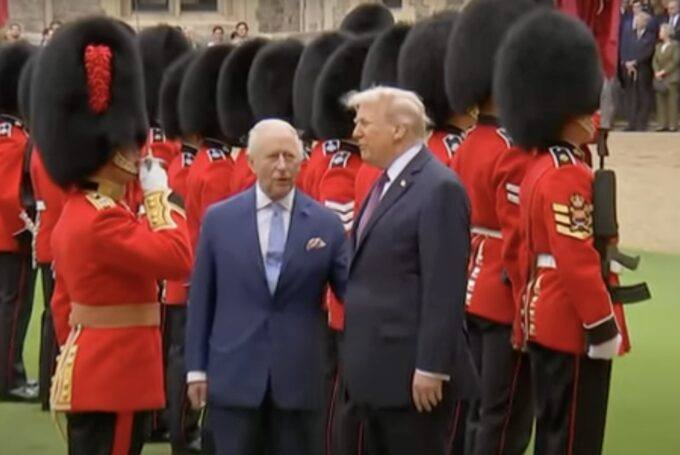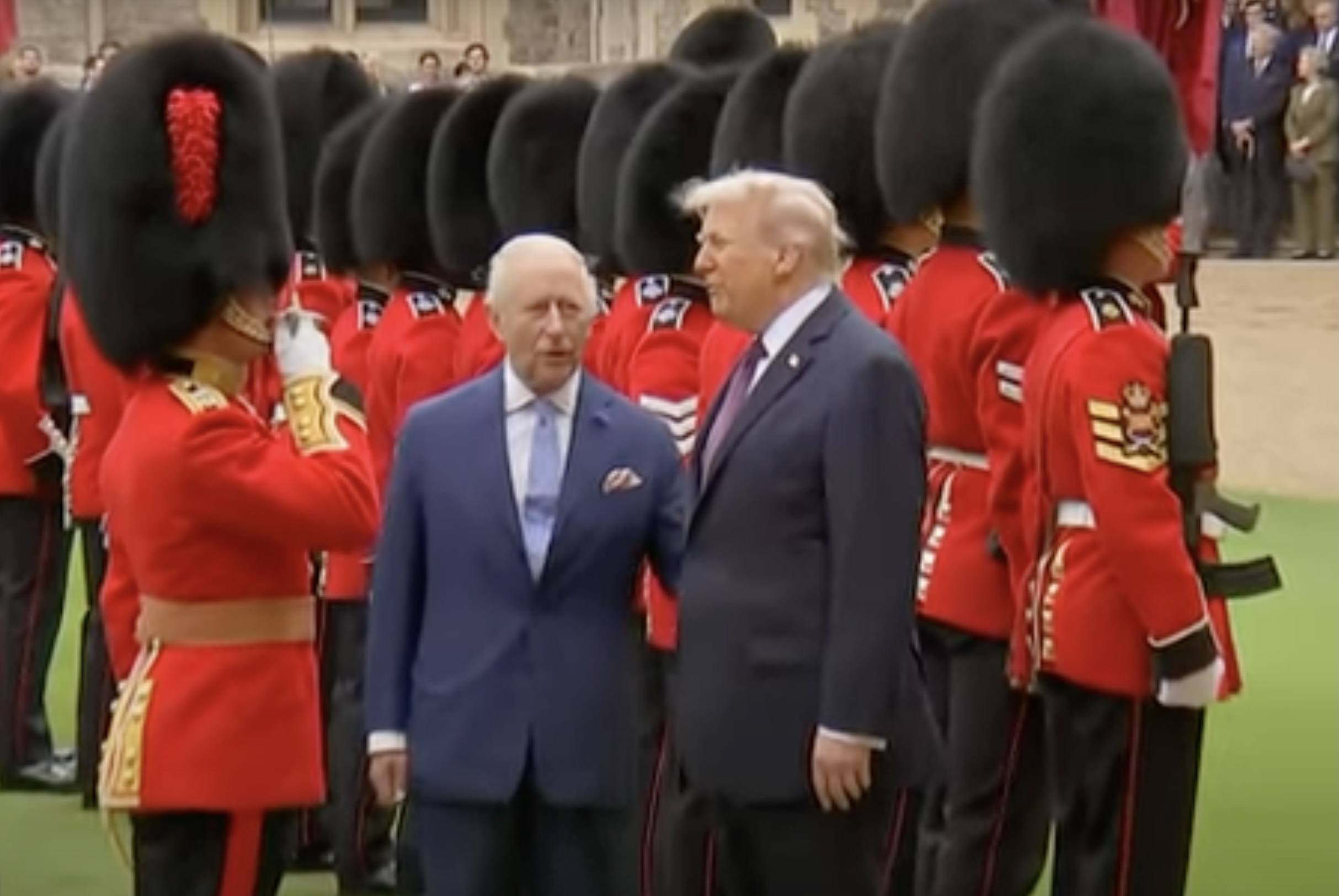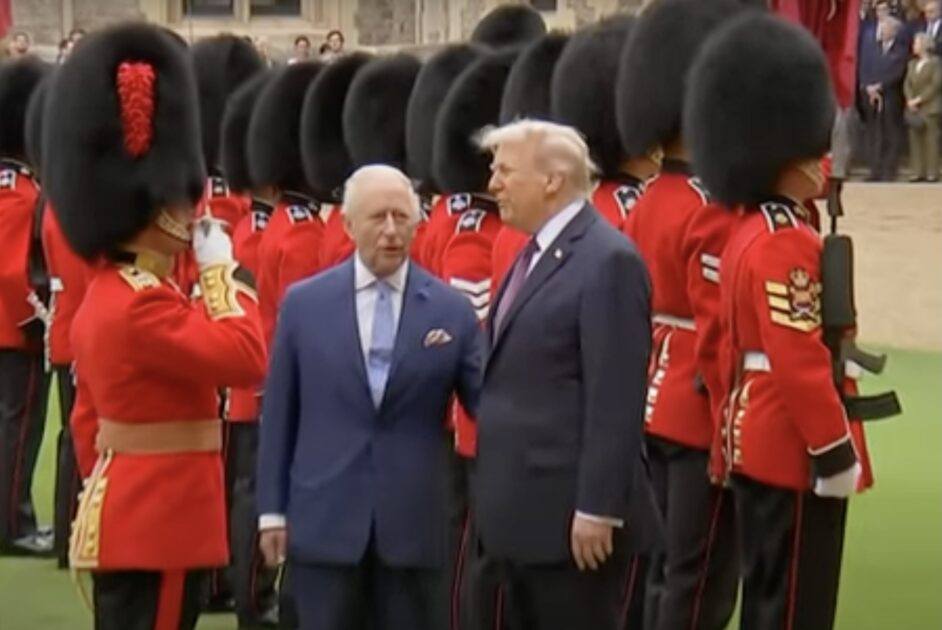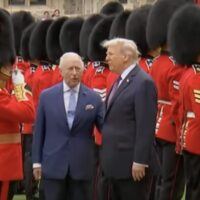Screenshot from BBC coverage of Trump at King Charles’ second home in Windsor.
Harry Fairground where is your faint light now on the corner of sea or black within that city of your going?
— Adrian Dannatt, Capacity for Loss
Most Londoners had half-forgotten about Trump’s state visit until Air Force One touched down. The capital was that distracted by the Mandelson scandal, Cabinet reshuffles, Tory defections, and brutish Tommy Robinson and his long march to what didn’t feel like freedom, the one at which Elon Musk appeared in Big Brother video-link style, warning us all over here we must fight or die. Thanks, but no thanks, Elon.
By contrast, the Trump visit had barely begun, and already the politics seemed drained from it—sucked out like venom from a snakebite.
Buckingham Palace was under renovation, so the state pageant shifted west to Windsor. Through Berkshire mist, Trump and Melania arrived at the oldest inhabited castle in the world—not just shielded from London’s anti-Trump protests, not just surrounded by a freshly erected ring of steel, but also greeted by the genteel calm of a town not exactly renowned for its Molotov cocktails. ‘Trump received the full Downton Abbey experience, with bagpipes and drums, to keep him on Britain’s side, but away from the Brits,’ noted Sam Kiley of The Independent. In Windsor, there were Grannies Against Trump but no suppression of kulaks and White Guards.
The Windsor household polished its rituals: carriage, salute, banquet. Lord Ricketts called it ‘pomp and pageantry with a purpose.’ Lord Glassman, oddly, compared Trump to Caesar—or was it Napoleon? The point seemed to be that monarchs and emperors knew how to host each other, even when they didn’t want to. Charles was earning his coins—the ones with his head stamped on them.
Around the spectacle buzzed a ragged chorus. London mayor Sadiq Khan denounced the 47th president as an encourager of intolerance: ‘Silence is no longer enough.’ Vance’s earlier summer jibes about the UK were still being referenced, but they pre-dated Trump’s visit. Away from Windsor’s pomp, life carried on with its own absurd counterpoints. My kids and their band were boarding a flight from Stansted to play a gig in Hamburg—sharing an airport, in effect, with the presidential arrival.
I was at Adrian Dannatt’s poetry launch in Mayfair, where I spoke with Trump’s famed chronicler, Michael Wolff. Painter, writer and film producer Danny Moynihan held court, a part-Celt sparkle in his eye. Wolff was affable, is brave; his super-smart wife Victoria I’d met in New York. Yet Wolff wasn’t over here for The Donald, but a new podcast series on Rupert Murdoch—with Alastair Campbell—Murdoch now cast as Trump’s rival nemesis. Murdoch, incidentally, would be at the next day’s Windsor Castle banquet.
The above was a reminder that the ‘real’ London lives elsewhere: in poetry readings, side-room conversations, kids’ gigs. The state visit was theatre. The city itself was still improvising.
Protesters at Windsor were projecting images and texts of Epstein, Prince Andrew, Trump and Melania, on one of the castle towers. It wasn’t exactly Buñuel scandalising Paris with Un Chien Andalou—ink bombs flying in the stalls—but it did join a long, odd history of imagery that caused a ‘wee’ stir, as Trump’s late Scottish mother might have pursed it. The four people arrested were not kept in the Dungeon of the Curfew Tower.
Meanwhile, the real kings arrived: Google pledging £5 billion in data centres, Microsoft £22 billion in AI, Blackstone billions in assets. ‘Blackstone is going to own the housing market,’ said a reliable friend. ‘And believe me it’s not a good thing.’ I am sure Palantir were kicking about somewhere.
A promised tariff deal on aluminium and steel looked like it was collapsing last minute, but the tribute kept flowing—algorithms in place of spices, reactors instead of gold. (Whisky, the Scots whispered, must surely be spared.) In the end, Starmer unveiled a £150 billion investment from US companies, over £300 billion combined, though former deputy prime minister Nick Clegg pointed out that the UK was becoming a ‘vassal state’ of the US. The same Clegg who retained shares worth an apparent $21m at Meta.
On Gaza, meanwhile, the UK was making no headway; two Labour MPs were denied entry by Israel to the West Bank. Was this because of Starmer about to recognise a Palestinian state? Trump, too, appeared at first glance adrift—ignored by Netanyahu, sidelined by Putin, but still glaringly opposed to Starmer on Ukraine.
Jefferson once wrote: ‘Kings are the servants, not the proprietors, of the people.’ Yet Windsor staged two kings—one literal, one metaphorical—each rehearsing mastery, each pretending servitude. It was politics as masque, pomp as emptiness. Gifts, inevitably, were exchanged.
There was another big protest in London, while Trump was cantilevering from Windsor. It saw former Daily Telegraph editor Max Hastings standing his ground against the American. Anti-Trump disgruntlement was not just the preserve of the left.
At the state dinner, the honoured guest described his visit as ‘one of the highest honours of my life.’ Michael Wolff on BBC’s Newsnight suggested the US president had just been reprimanded by the real King. ‘In two world wars we fought together to defeat the forces of tyranny,’ said the King. ‘Today, as tyranny once again faces Europe, we and our allies stand together in support of Ukraine to deter aggression and secure peace.’ He said this looking down at Trump, without aggression, as Trump, seated, looked up.
Trump said: ‘Shakespeare, Tolkien, Orwell are unbelievable people like we have rarely seen before, probably maybe we won’t even see again.’
Next day at Chequers—the prime minister’s country seat, a sprawling manor house two centuries older than the United States—Trump and Starmer held their much anticipated press conference. If Windsor was a masque, Chequers was the boardroom: all oak panels and Tudor ghosts, where power rehearsed itself in the cadence of questions and evasions. The choreography was pure theatre, man, a ritual of civility for a leader often living on rupture.
Chequers gave Trump what he wanted: cameras, a backdrop of drapes and portraits, the sense that he was speaking not just to Britain but to history itself. Yet it also seemed to swallow him. Against those walls, the bravado thinned. As with Windsor, what is four years—or eight—in a room that has watched so many rulers pass, and mostly be forgotten?
The masque, then, ran its course. Windsor for pageantry, Chequers for diplomacy, London for protest, the City for contracts. A still-fizzing circuit is complete. But the conclusion was less resolution than recursion: the play repeats, each new sovereign or president stepping into the same old rituals, the same negotiations. Kingship, presidency, kinship, precedence, even prime ministerial tenure—all are temporary roles in a drama staged for permanence.
And yet, permanence is the illusion. Beneath the gilt banquets and oak beams, what remains is money, data, algorithms, war, and sleights of hand. The masque is always cover for the ledger. Jefferson’s line about kings as servants has become hollow: they serve capital now, not citizens.
The great takeaway of Trump’s state visit? That Britain can still stage a first-rate costume drama, complete with castles, carriages, and reluctant courtiers. That we are an AI superpower now. Chequers played its role as antique wallpaper. Windsor produced its bagpipes on cue. The visiting monarch praised Tolkien, the resident monarch praised Ukraine, and the rest of the two countries went back to watching Netflix. Curtain down, masque over—until the next sovereign in search of a photo-op arrives.
The post King on King: A Masque in Fog appeared first on CounterPunch.org.
From CounterPunch.org via this RSS feed






